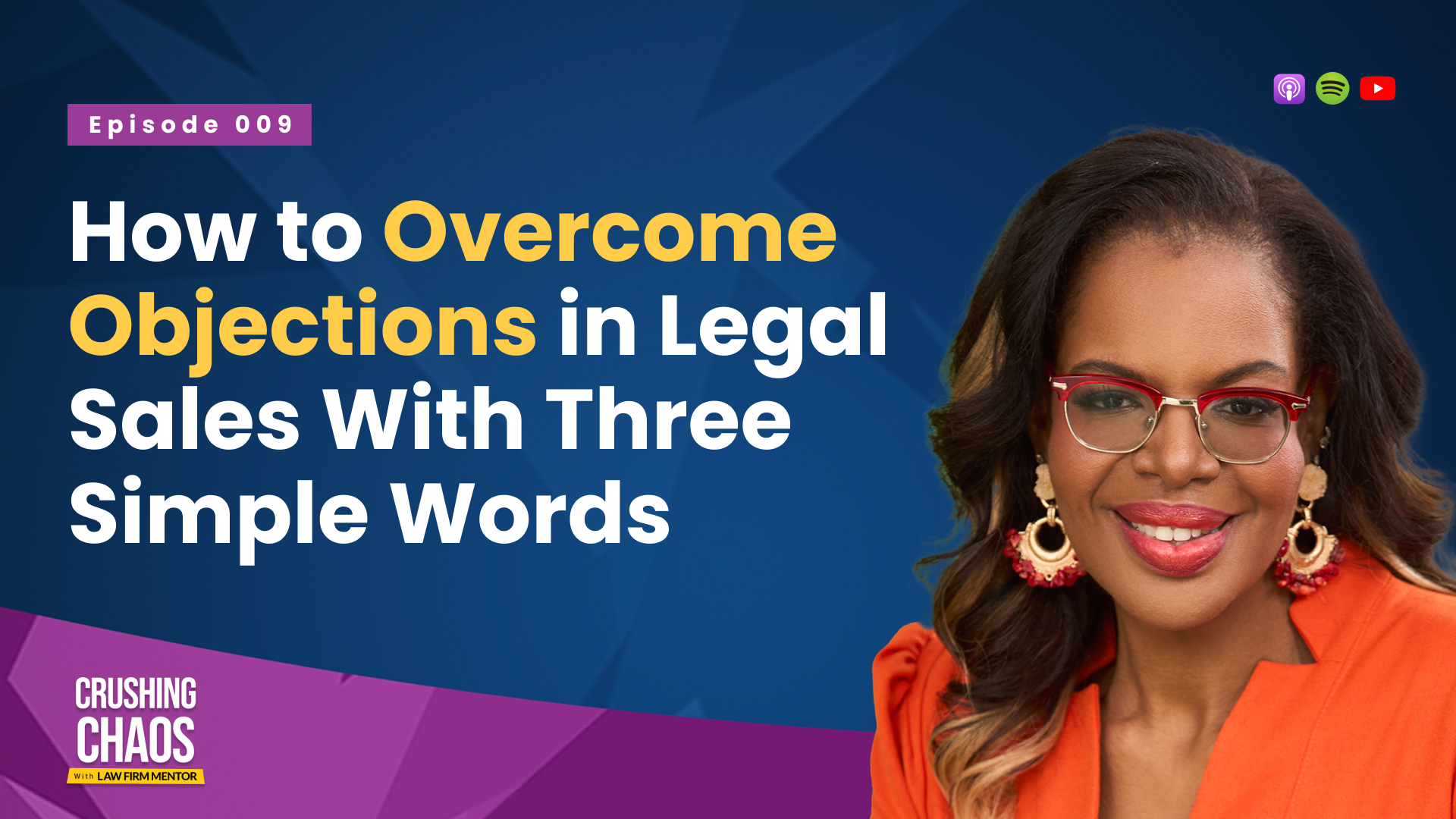The Real Reason Lawyers Struggle With Sales
Many lawyers are incredible advocates in the courtroom but struggle to advocate for themselves during a sales conversation. It’s not because they can’t close deals—it’s because they don’t want to come across as pushy. The word sales often triggers discomfort for attorneys who entered the profession to serve, not to sell.
But here’s the truth: if you can’t confidently sell your services, you can’t sustain your firm. A profitable law firm depends on consistent client conversions. That doesn’t mean being manipulative or aggressive. It means learning how to handle objections in a way that builds trust, not tension.
In this episode of Crushing Chaos with Law Firm Mentor, Allison Williams reveals how three simple words can transform your sales conversations: Feel, Felt, Found. This proven framework helps you connect with potential clients, ease their concerns, and guide them from hesitation to confidence—without pressure or persuasion.
Why Learning to Sell is Non-Negotiable
You might think, “I’m a lawyer, not a salesperson.” But the reality is that every law firm owner must learn to sell—even if they eventually delegate that role. As Allison explains, knowing how to sell empowers you to:
- Evaluate the performance of your sales team or intake staff.
- Stay in control of your business rather than depending entirely on others.
- Rebuild quickly if circumstances change—for instance, if a key employee leaves with clients or referrals.
Sales mastery isn’t about greed; it’s about security and sustainability. It ensures that your ability to serve doesn’t depend on chance.
Step One: Feel – Lead With Empathy
When a potential client raises an objection—for example, “I need to talk to my spouse first” or “That’s too expensive”—the worst response is to disagree or debate. Pushing back instantly creates resistance. Instead, start with empathy.
Say something like, “I understand how you feel.”
Those five words acknowledge their emotion and open the door for connection. Your tone matters as much as your words—you must genuinely mean it. This validation shows that you’re listening and that their concern is valid.
When clients feel heard, they let their guard down. They stop seeing you as a salesperson and start seeing you as a trusted advisor.
Step Two: Felt – Normalize Their Concern
Next, show them they’re not alone: “Other clients have felt the same way.”
This step turns their isolated worry into a shared experience. When clients realize others have been in their shoes, it eases the fear of making a wrong decision. It taps into a universal human need—belonging.
By referencing others who once shared their hesitation, you build credibility. You demonstrate that you’ve seen this before and helped people overcome it successfully. That reassurance is powerful.
Step Three: Found – Show the Positive Outcome
Finally, pivot to results: “What our clients have found is…”
This is where you reveal what happens after clients take action. Maybe they found that investing in legal help early saved them stress, money, or time. Maybe they realized that waiting only made their problem worse.
This statement anchors your response in real outcomes. It shifts the conversation from fear to possibility—from cost to value.
As Allison explains, Feel, Felt, Found isn’t just a technique. It’s a mindset. It allows you to stay calm, compassionate, and confident, even when clients hesitate.
Building Confidence in Every Conversation
Confidence in sales doesn’t come from memorizing scripts—it comes from practice and preparation. Anticipate objections before they happen. Address common concerns throughout your consultation, not just at the end.
You can weave mini case studies into your discussion:
“A lot of clients initially felt uncertain about committing, but once they started working with us, they found the process brought them peace of mind and clarity.”
That proactive communication prevents surprise objections and keeps the conversation collaborative.
Bringing It All Together
Overcoming objections isn’t about clever wordplay—it’s about empathy, understanding, and leadership. When you use Feel, Felt, Found, you transform objections from obstacles into opportunities to deepen trust.
So, the next time you hear hesitation, remember:
- Feel: Validate their emotion.
- Felt: Relate through shared experience.
- Found: Offer hope and results.
When you approach sales as service, you don’t just close more clients—you create stronger relationships and a more sustainable firm.
Watch the full episode:
🎥 YouTube
🎧 Spotify
🎧 Apple Podcasts
Ready to crush chaos and master your law firm sales process?
Book a Discovery Call with Law Firm Mentor and learn how to transform objections into opportunities.

